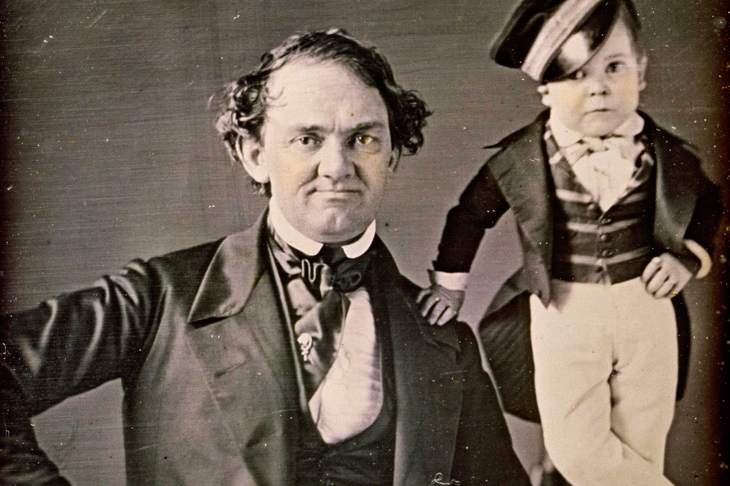‘There’s a sucker born every minute.’ That was the P.T. Barnum battle cry. It has come to have a ring of contempt, but no one loved a sucker more than Barnum. Entertain them, he said. Thrill them, shock them. Make ’em laugh, make ’em cry. Give ’em the old razzle-dazzle. And if, in the course of the evening, you extract from them a penny, a shilling, a dollar… Well, have you not given them a story to tell their friends tomorrow?
His critics called him a scoundrel, a humbug, a con man. To the Times he was ‘the most adventurous and least scrupulous of showmen… an apotheosis of notoriety’. His defence? What he did wasn’t cheating or swindling: it was show business.
Did the public object to making Barnum rich in what he happily called ‘dirty dollars’? Did they hell! They queued round the block to give him their last cent. They named their babies after him. Fan mail arrived from all over the world addressed to: ‘Barnum, America’. A little boy at one of Barnum’s shows of fantastic beasts tugged his father’s sleeve and asked: ‘Say, Pa, which cage is Barnum in?’ A bear, a whale, a REAL!, AUTHENTIC!, BO-NA FI-DE! mermaid were interesting enough, but a Barnum… Now, that was a creature worth seeing.
And see him you will this Christmas, played by Hugh Jackman in The Greatest Showman, an all-singing, all-dancing, all-elephants film of his life, and by Marcus Brigstocke in a revival of the 1980 Broadway stage musical Barnum.
Expect adverts, trailers, posters. Expect hype worthy of the great showman himself. Roll-up, roll-up! ‘Advertising is like learning,’ quipped Barnum. ‘A little is a dangerous thing.’ And if the reviews are bad? No matter. Barnum always said he didn’t care what the public thought of him, so long as they talked about him.
Barnum, born in small-town Connecticut in 1810, was a poor boy made good many millions of dollars over. Before his 12th birthday he was earning money selling cherry rum to soldiers. He sold lottery tickets, candy, ale, oysters and illustrated Bibles. Aged 17, he opened a porterhouse in Brooklyn. Any spare dimes went on nights at the theatre. He worked in a hat shop, took in boarders, ran a grocery store in New Yoick City. When the articles he submitted to newspapers were spiked, he bought a press and founded his own. When he was sued for libel, he edited from his jail cell. He worked as an advertising copywriter and — last refuge of the scoundrel — as a Sunday newspaper journalist. He invested — badly — in cologne water and a tincture of bear’s grease to restore hair to bald heads.
In 1835, he bought an interest in Joice Heth, a 161-year-old ‘negress’ who had been nurse, so the posters said, to George Washington. New Yorkers paid to see her and hear a voice from history. Joice was his first success. ‘Signor Antonio’, who balanced bayonets on his nose, was his second. Barnum turned a profit, bought Scudder’s American Museum and filled the halls with jugglers, gypsies, rope-dancers, albinos and a mermaid with a monkey’s head. He paid a dogsbody to pose as ‘Dr Griffin’ of the London Lyceum of Natural History — an ‘expert’ in marine life: ‘Yes, it’s a real mermaid. Tickets selling fast.’
When a violinist failed to pull in punters, Barnum pasted the posters upside-down. Crowds surged to see the musician who could play standing on his head. One Fourth of July, the museum became dangerously overcrowded. Quick-thinking Barnum ordered his sign painter to write in large letters: ‘To The Egress’. ‘To the Aigress,’ said visitors. ‘Sure, that’s an animal we haven’t seen.’ They found themselves in a back street off Broadway.
He hosted competitions for darlingest dogs and chirpiest chickens and bonniest babies. He lured the singer Jenny Lind, ‘the Swedish Nightingale’, to America. He paid her $187,500 and rivals rubbed their hands at Barnum’s imminent ruin. In nine months, Barnum and his Nightingale made $712, 161.
Barnum bought grizzly bears, Ceylon elephants, white whales and a sea lion called ‘Old Neptune’. He exhibited duelling giants and a bearded lady with her bearded baby. His greatest performer — and lifelong friend — was General Tom Thumb the dwarf. Together, Barnum (6ft 2in) and Tom (2ft 1in) toured Europe. At Buckingham Palace, Tom duelled with Queen Victoria’s poodle. The Queen was amused. On his return, Tom was received at the White House. Barnum made Tom rich. He bought yachts, houses, horses, carriages, jewels and cigars. (The horses were Shetland ponies.) Barnum acted as matchmaker to Tom Thumb and Lavinia Warren, a shy, pretty dwarf in the company. It was a happy marriage.
Today, Barnum’s antics smack of exploitation. His menageries would dismay animal-rights activists. All the animals in the film — elephants, horses and fire-jumping lions — are CGI. We do not like to think of men and women gawped at because they are old or small or tall or black or Chinese or simply different. ‘He started cynically,’ says Michael Gracey, the Australian director of The Greatest Showman, ‘by wanting to make money. He later realised he’d made a family. He took these people who were invisible to society and made them stars. And more than that he made them feel loved.’ When Barnum filed for bankruptcy after one of his eccentric investments, Tom Thumb helped him back on his feet. ‘Barnum inadvertently celebrated what it means to be different. He taught people that being unique is a strength.’
Who are the Barnums of today? Simon Cowell, insatiably hunting his next act? Teetotal Trump, master of the fake-news media circus? (Barnum was a Christian prohibitionist who toasted his stars with bumpers of cold water.) Michael Gracey suggests Apple impresario Steve Jobs or music producer Jay-Z. ‘Like Barnum, they are products of their own invention, their own showmanship. Larger-than-life characters with a huge following.’ He calls Barnum’s first nights: ‘an 1800s equivalent of a Jobs Apple conference. Think of an iconic figure waiting backstage.’
He certainly inspired fan worship. A woman who had read Barnum’s autobiography wrote to tell its author: ‘You have no idea how much I enjoy reading it.’ ‘My dear madam,’ Barnum replied, ‘that is nothing to the way I enjoy living it.’






Comments